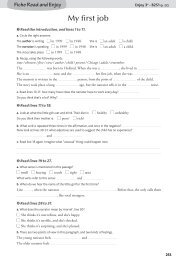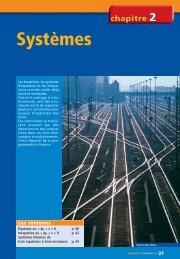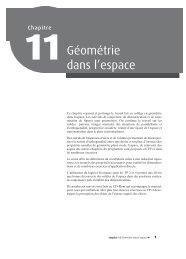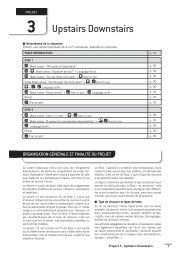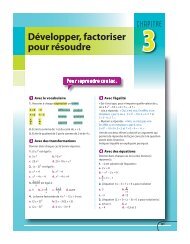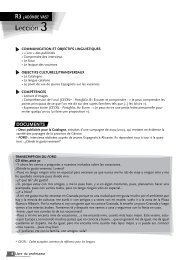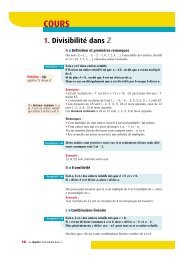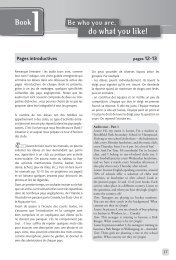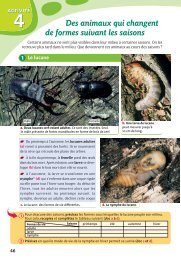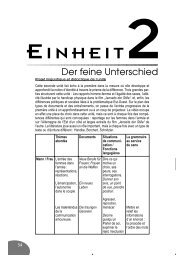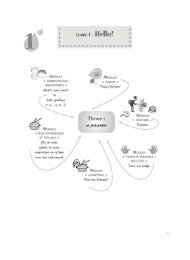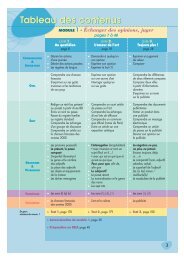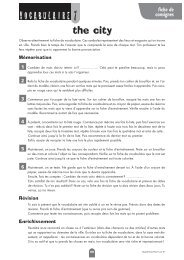Children at work - Didier
Children at work - Didier
Children at work - Didier
Create successful ePaper yourself
Turn your PDF publications into a flip-book with our unique Google optimized e-Paper software.
ÉVALUATION DE LA COMPRÉHENSION<br />
Deux appareils d’évalu<strong>at</strong>ion sont proposés : le premier de « type bac » où la compréhension est vérifiée par la production,<br />
le second ne vérifiant que la compréhension pour une évalu<strong>at</strong>ion de l’activité langagière en elle-même.<br />
n<br />
Évalu<strong>at</strong>ion de la compréhension écrite<br />
Appareils d'évalu<strong>at</strong>ion<br />
Æ Voir textes photocopiables p. 289<br />
n<br />
Évalu<strong>at</strong>ion de type 1 : corrigé et barème<br />
1. ˝ The main character is a child. 1 pt<br />
2. ˝ Slavery<br />
Æ In exchange for a small sum of money, about $16,<br />
they agreed to send their son to <strong>work</strong> in a nearby carpet<br />
factory until he had earned enough money to pay back<br />
the loan.<br />
˝ Child labour<br />
Æ Each morning, six days a week, more than half a<br />
million children between the ages of four and fourteen<br />
rise before dawn and make their way along dark<br />
country roads leading to Pakistan’ s carpet factories.<br />
The carpet weavers <strong>work</strong> 14 hours a day, with only a<br />
30-minute break for lunch. Iqbal Masih was one of<br />
these <strong>work</strong>ers.<br />
1,5 pt x 2 = 3 pts<br />
3. a. ˝ wrong<br />
Æ “At 6.a.m.” (l. 6)<br />
b. ˝ right<br />
Æ “More than half a million children between the ages<br />
of four and fourteen rise before dawn and make their way<br />
along dark country roads leading to Pakistan’s carpet<br />
factories.” (l. 1 à 3)<br />
c. ˝ right<br />
Æ “In exchange for a small sum of money, about<br />
$16, they agreed to send their son to <strong>work</strong> in a nearby<br />
carpet factory.” (l. 12 à 14)<br />
d. ˝ wrong<br />
“Iqbal was told he would be paid three cents a day for<br />
his <strong>work</strong>.” (l. 15)<br />
e. ˝ wrong<br />
Æ “Iqbal went to the local police to complain. He told<br />
them th<strong>at</strong> his boss had be<strong>at</strong> him up and showed them<br />
the bruises on his arms.” (l. 33 à 35)<br />
f. ˝ wrong<br />
Æ “One of the police officers glared <strong>at</strong> Iqbal. He told<br />
him he had no right to complain he’d better stick to his<br />
<strong>work</strong> and do wh<strong>at</strong> he was told. The officer grabbed Iqbal<br />
by his sore arm and led him back to the factory. If he<br />
tries this again, chain him to his loom, the officer told<br />
Arshad.” (l. 35 à 39)<br />
g. ˝ wrong<br />
Æ “Even when Iqbal hurt so much he could hardly<br />
move, he fought back.” (l. 40) 1 pt ¥ 7 = 7 pts<br />
4. Iqbal was born in a very poor family. His parents didn’t<br />
have enough money to feed their children or to buy them<br />
clothes / to support their children / to provide for them,<br />
th<strong>at</strong>’s why they accepted to sell him to a carpet factory<br />
owner.<br />
3 pts<br />
5. The boss didn’t want carpet weavers to talk because if<br />
they talk they make mistakes and if they make mistakes<br />
they have to do the job again and the boss loses money.<br />
2 pts<br />
6. Carpet weavers have to get up very early to report to<br />
<strong>work</strong> <strong>at</strong> 6 a.m. They are compelled to <strong>work</strong> for 14 hours<br />
with only a 30-minute break for lunch. If they are l<strong>at</strong>e<br />
or if they complain they can be be<strong>at</strong>en or hung upside<br />
down. They are not allowed to talk to each other while<br />
they are <strong>work</strong>ing and they have to <strong>work</strong> in a very dark<br />
environment. They earn very little money. 4 pts<br />
n<br />
Évalu<strong>at</strong>ion de type 2 : corrigé et barème<br />
Inform<strong>at</strong>ion about the<br />
country and <strong>work</strong> environment<br />
Details about <strong>work</strong>ing<br />
conditions<br />
Details about the main<br />
character and his background<br />
The main character’s<br />
actions<br />
Bonus: the main character’s<br />
personality<br />
Pakistan – carpet factories – child labour (more than half a million<br />
children…)<br />
have to get up very early to report to <strong>work</strong> <strong>at</strong> 6 a.m. / compelled to<br />
<strong>work</strong> for 14 hours with only a 30-minute break for lunch / if l<strong>at</strong>e,<br />
can be be<strong>at</strong>en or hung upside down / not allowed to talk to other<br />
children while <strong>work</strong>ing / have to <strong>work</strong> almost in the dark / earn very<br />
little money<br />
Iqbal – started <strong>work</strong> when he was four – very poor parents –<br />
farmers – lived near Lahore – was sold by his parents ($16)<br />
The main character’s actions he complained to the police about<br />
being be<strong>at</strong>en / fought back<br />
strong – not submissive<br />
3 pts<br />
8 pts (1,5 pt<br />
/ élément)<br />
5 pts<br />
4 pts<br />
2 pts<br />
Project 1 - <strong>Children</strong> <strong>at</strong> <strong>work</strong><br />
21



